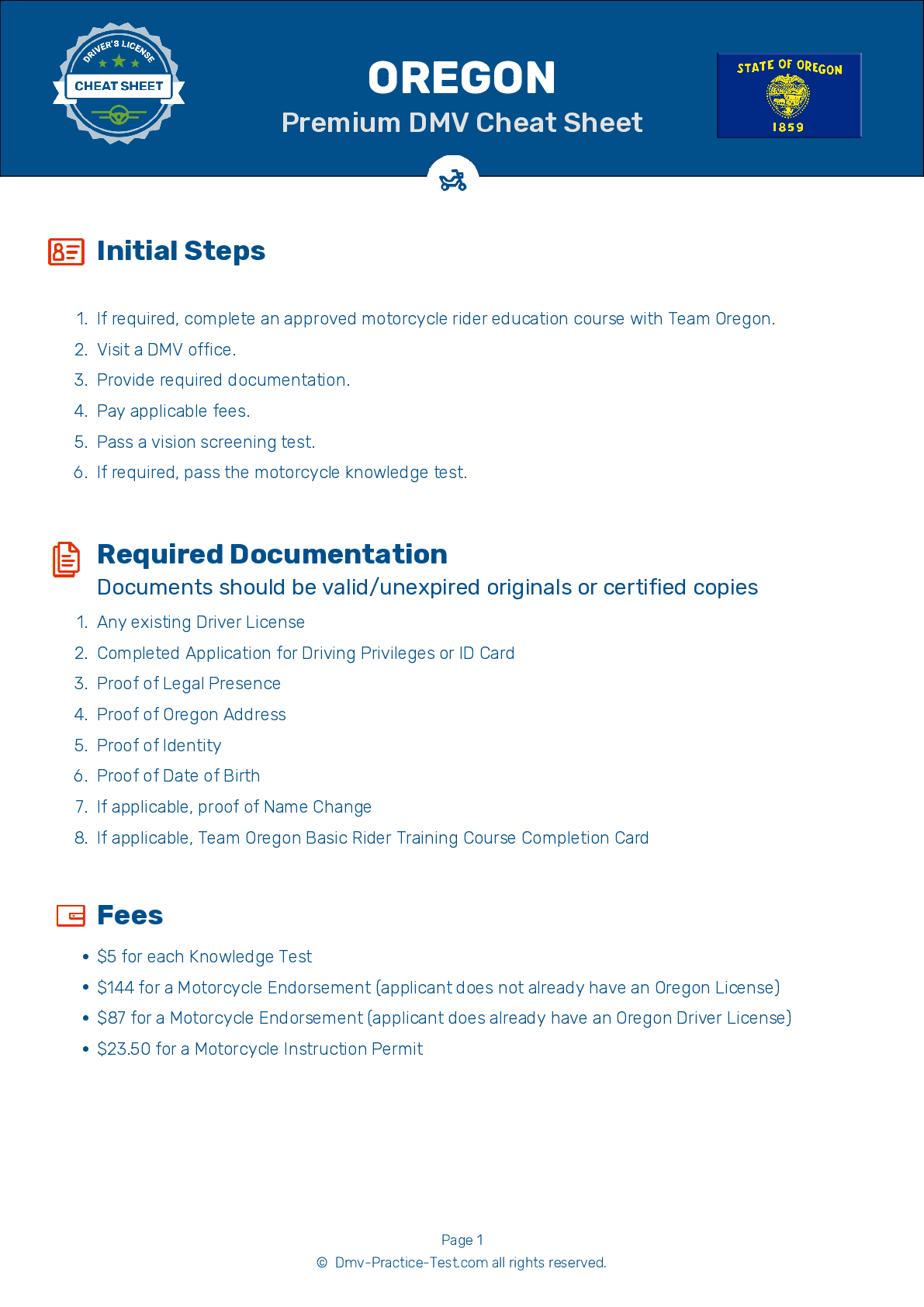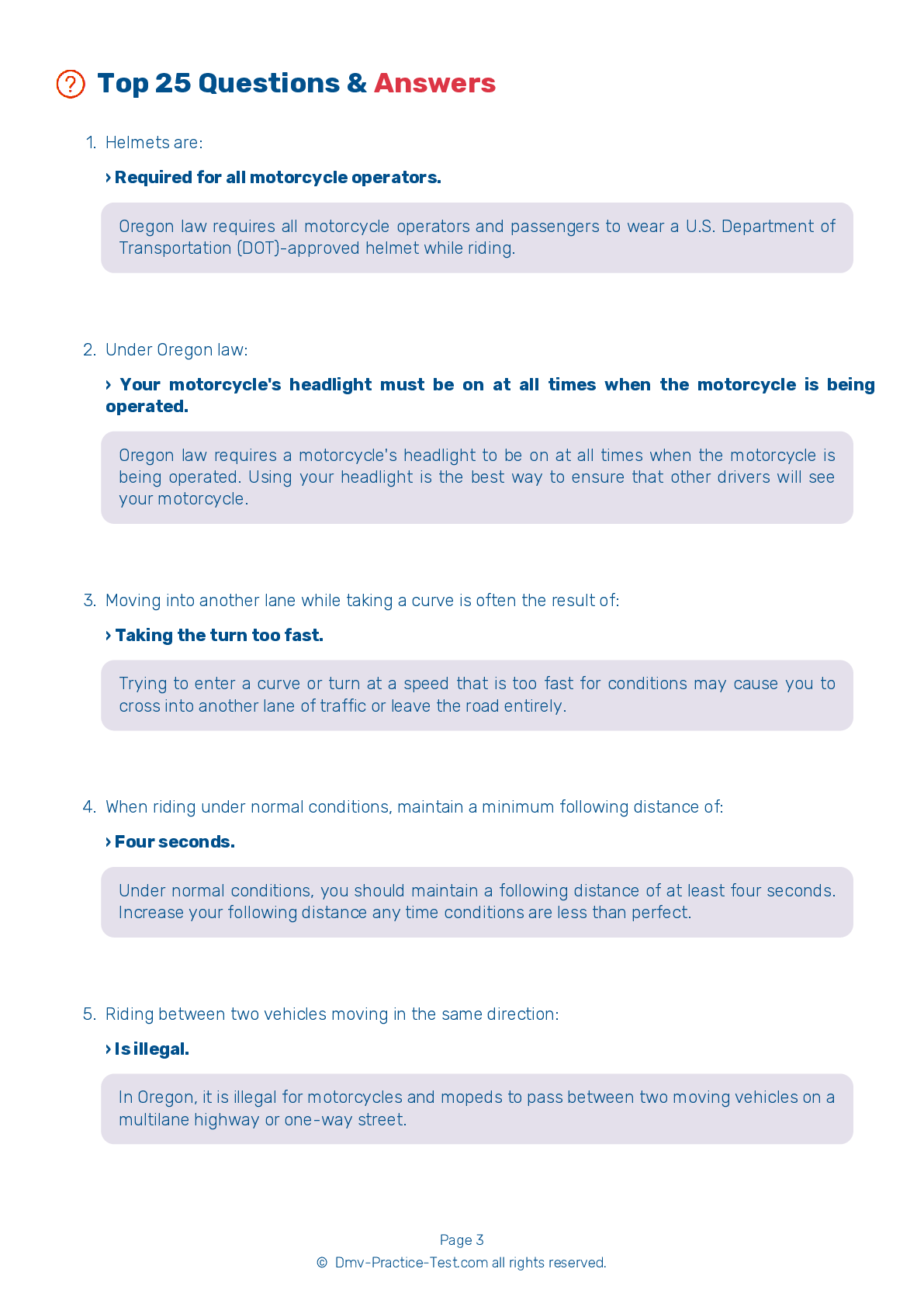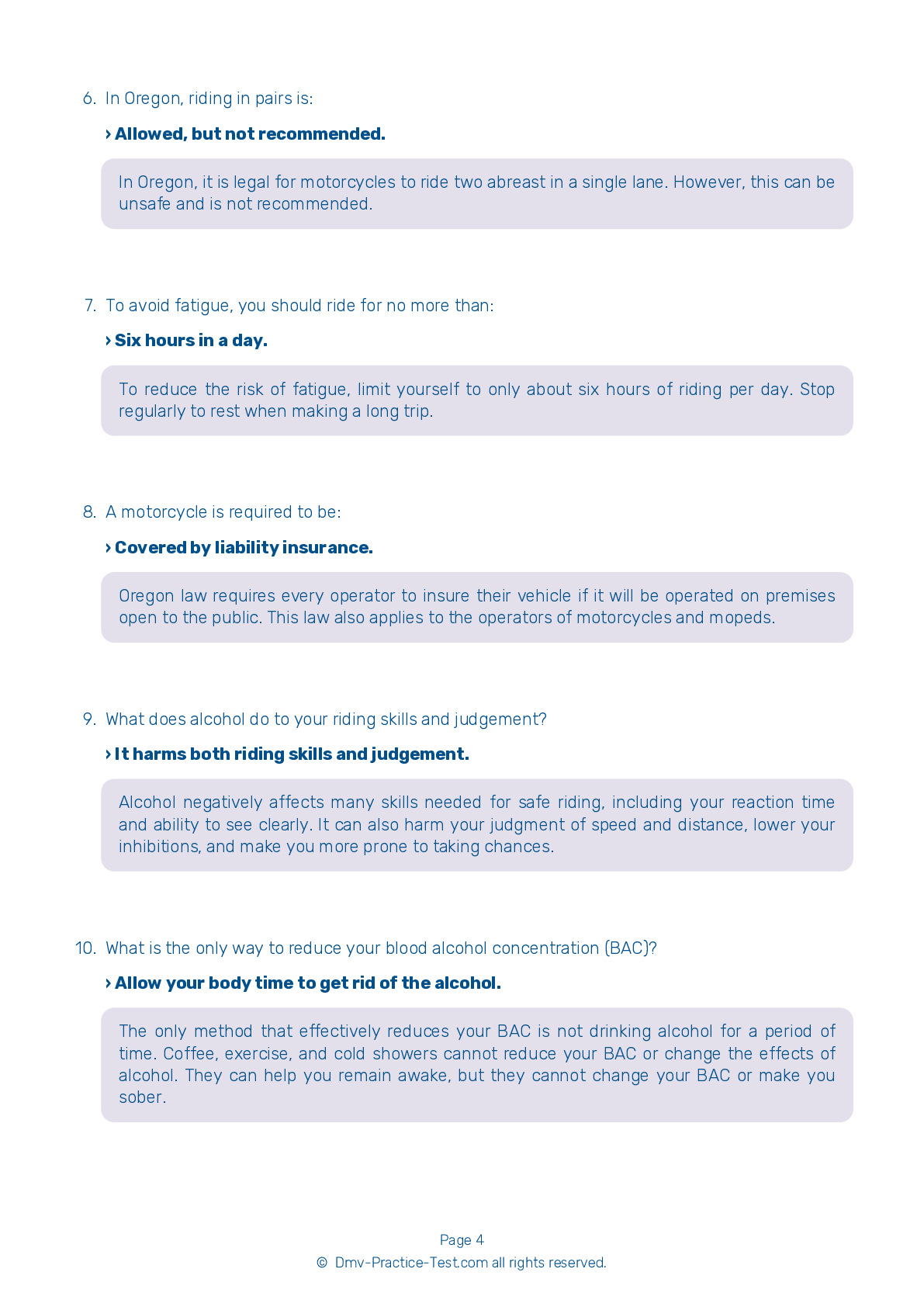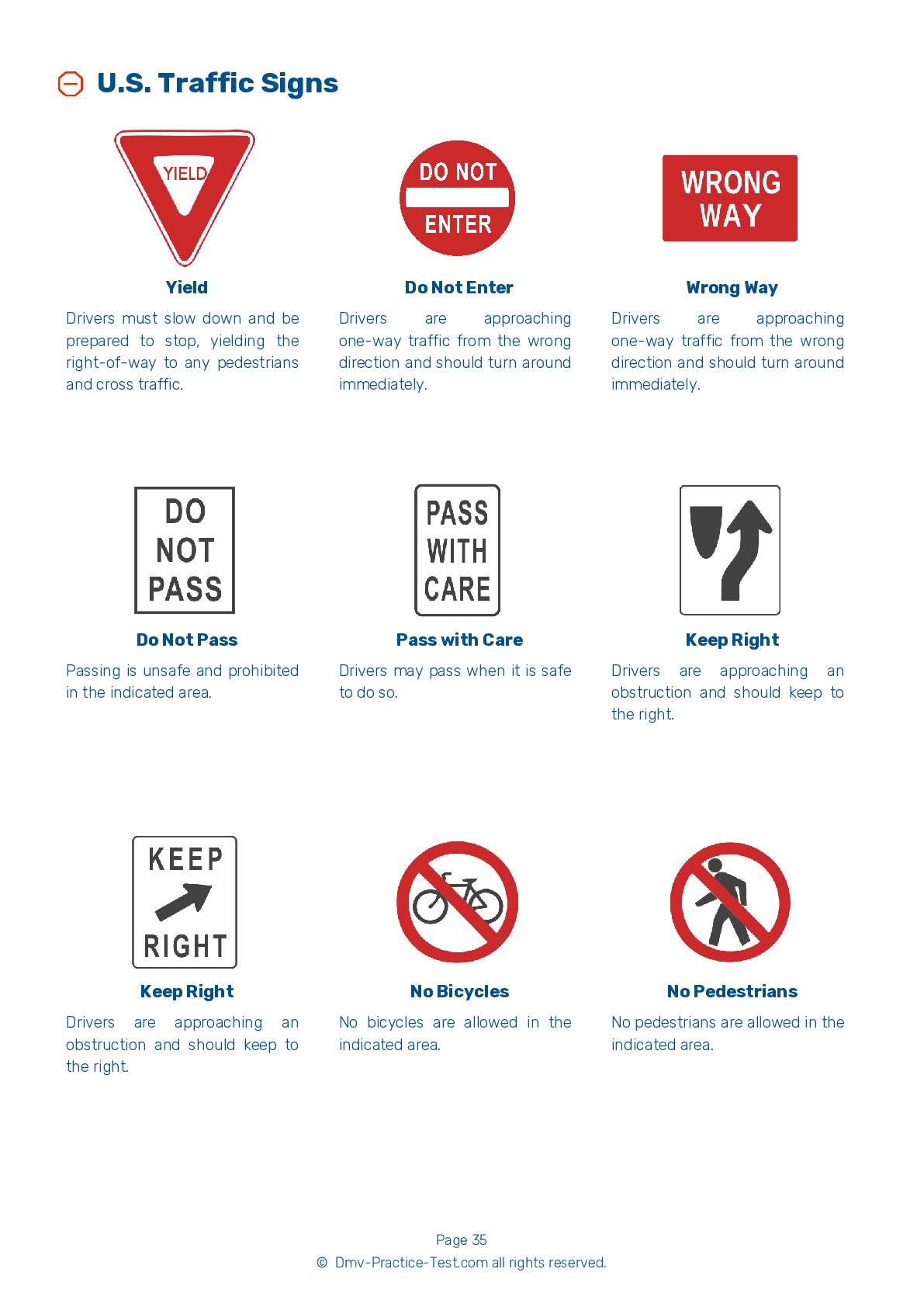DMV Permit Test #14
Motorcycle Test | License OR 2026 | FREE Online Practice! #14 Page 4 of 4
Take this FREE motorcycle test (license in OR 2026) to check your knowledge of the road rules. To improve your results, download a motorcycle handbook online, study theory, and practice for free on our website. Still worried about how to get a motorcycle license in Oregon in 2026? Check our website for more sample tests, train as much as possible, and boost your grades!
25
20
16
19 . A plastic, shatter-resistant face shield:
Is less effective than goggles.
A plastic, shatter-resistant face shield can help protect your whole face if you are involved in a crash. Goggles protect your eyes, but not the rest of your face. A windshield is not an adequate substitute for googles or a face shield.
20 . To avoid fatigue, you should ride for no more than:
10 hours in a day.
To reduce the risk of fatigue, limit yourself to only about six hours of riding per day. Stop regularly to rest when making a long trip.
21 . If you are unable to avoid hitting an object in the roadway, you should:
Stay seated on the motorcycle.
If you cannot avoid hitting an obstacle in the roadway, you should try to hit it at as close to a 90-degree angle as possible. Slow down as much as you can before contact, keep your motorcycle upright, rise slightly off of your seat, and roll the throttle slightly to lighten the front end just before impact.
22 . Generally, the body eliminates one alcoholic drink per hour. If a person consumed eight alcoholic drinks four hours ago, how many drinks likely remain in their body?
Four drinks
The minimum number of drinks left in a person's system can be estimated by subtracting the number of hours since the last drink from the total number of drinks consumed. In this case, the alcohol content of about four drinks would remain.
23 . A motorcycle operator can slow down by:
Rolling on the throttle.
Motorcyclists often slow down by simply downshifting. Motorcyclists should be aware that slowing down in this manner does not activate the brake lights.
24 . To cross tracks that run parallel to your lane, you should:
Wait for the tracks to end.
To safely cross trolley tracks, railroad tracks, ruts, or pavement seams running parallel to your lane, move to a lane position that will allow you to cross them at an angle of at least 45 degrees. Then, make a quick, sharp turn. If you try to edge across, the tracks or seam could catch your tires and throw you off balance.
25 . Maximum straight-line braking is done by:
Using the front and rear brakes at the same time while locking the rear wheel.
Maximum straight-line braking is accomplished by simultaneously applying both the front and rear brakes without locking either wheel.
2026 Oregon | Frequently Asked Questions
To acquire a motorcycle license in Oregon, you must first obtain a motorcycle instruction permit. This involves passing a knowledge test. After practicing with the permit, you can take the motorcycle skills test to get your license. Alternatively, you can complete a Team Oregon Basic Rider Training course which waives the DMV knowledge and skills tests.
In Oregon, the minimum age to obtain a motorcycle endorsement or license is 16. However, individuals under 18 must complete an Oregon Department of Transportation-approved motorcycle rider education course. They must also have had their driver's license for at least six months before they can apply for a motorcycle endorsement.
Yes, in Oregon, you need a dedicated motorcycle endorsement to legally ride a motorcycle. You can add this endorsement to your regular driver's license after passing a written exam and a skills test. Alternatively, you can complete a Team Oregon Basic (or Intermediate) Rider Training course which waives the need for these tests at DMV.
To apply for a motorcycle license in Oregon, you'll need the following documents: proof of identity (like a birth certificate or passport), proof of Social Security number, proof of Oregon residency, and proof of legal presence in the U.S. If you're under 18, you'll also need a parent or guardian's signature on the application form.
Yes, in Oregon, you must pass a written exam to get a motorcycle license. The test covers topics such as traffic laws, safety rules, and identifying road signs. This is to ensure that you understand the rules of the road and can operate a motorcycle safely. However, completion of an approved motorcycle rider education course can waive this requirement.
The Oregon motorcycle written test covers a variety of topics related to motorcycle operation and safety. These include understanding road signs and signals, rules of the road, safe riding techniques, how to handle hazardous conditions, and motorcycle-specific laws. The test is designed to assess your knowledge of safe and responsible motorcycle riding.
Yes, in Oregon, you can substitute the written and skills tests with an approved motorcycle rider education course. Upon successful completion of the course, you'll receive a completion card that you can submit to the DMV within 12 months to waive these tests. This option is available for both new and experienced riders.
To enroll in a motorcycle training course in Oregon, visit the Team Oregon website and choose a course suitable for your skill level. You'll need to pay a fee which varies by course. After payment, you'll receive a confirmation email with details about the class location, what to bring, and when to arrive. Be sure to bring the necessary gear and identification.
No, you don't have to own a motorcycle to take the license test in Oregon. You can use any street-legal, registered, and insured motorcycle for the test. However, make sure that the motorcycle you use is appropriate for the class of license you're applying for and always wear the required safety gear.
Yes, you can use a friend's motorcycle for the Oregon DMV motorcycle skills test, provided it is street-legal, registered, and insured. The motorcycle should also match the class of motorcycle license you are applying for. Remember to wear appropriate safety gear during the test.
Yes, during the Oregon motorcycle driving exam, specific handling skills are tested. These include left and right turns, sudden stops, swerving, and obstacle avoidance. The test also assesses your ability to balance the motorcycle at slow speeds, proper use of mirrors and signals, and adherence to traffic rules. Mastery of these skills is crucial for safe motorcycle operation.
Yes, in Oregon, new motorcycle drivers under the age of 21 are required to complete an approved Team Oregon Basic Rider Training course before they can get their motorcycle endorsement. Also, for the first year after getting the endorsement, they are not allowed to carry passengers or ride between sunset and sunrise.
Yes, your Oregon driver's license with a motorcycle endorsement is valid across the United States. However, it's essential to understand that you must comply with each state's specific motorcycle laws when traveling, such as helmet requirements or lane splitting regulations. Always research local regulations before you ride out of state.
Yes, in Oregon, it's mandatory for all motorcycle riders and passengers to wear approved motorcycle helmets. This law is in place to protect riders from serious injury or death in the event of a crash. The helmet must meet Department of Transportation standards to be considered approved.
Yes, in Oregon you can apply for different types of motorcycle licenses. You can get a motorcycle endorsement (Class M) added to your regular driver's license, or you can get a motorcycle-only license (Class M) if you don't have a regular license. There's also a restricted Class M license for motorcyclists under 21 years old. Each type requires a different process and testing.
Yes, you can add supplementary endorsements to your motorcycle license in Oregon. This could include a sidecar/trike endorsement if you intend to operate a three-wheel motorcycle. To add an endorsement, you'll need to pass both a knowledge test and a skills test specific to the type of endorsement.
Yes, the Oregon DMV offers the motorcycle license test in several languages other than English. These include Spanish, Russian, Vietnamese, Japanese, Korean, and Chinese. If you need the test in a language not listed here, it's best to contact the Oregon DMV directly to inquire about available options.
An effective strategy to prepare for the motorcycle license test is to study the Oregon Motorcycle & Moped Manual thoroughly. It covers all the information you need to pass the test. You can also take online practice tests to familiarize yourself with the format and types of questions asked. It's also helpful to review road signs and signals, and understand motorcycle maintenance basics.
Yes, the Oregon DMV offers the motorcycle written exam in several languages other than English. These include but are not limited to Spanish, Russian, Vietnamese, and Chinese. However, it's advisable to contact your local DMV office in advance to confirm the availability of the test in your preferred language.
Yes, if you do not pass the motorcycle written test in Oregon, you are allowed to retake it. There may be a waiting period before you can retake the test and possible additional fees. It is recommended to study the Oregon Motorcycle & Moped Manual thoroughly before attempting again to increase your chances of passing.



